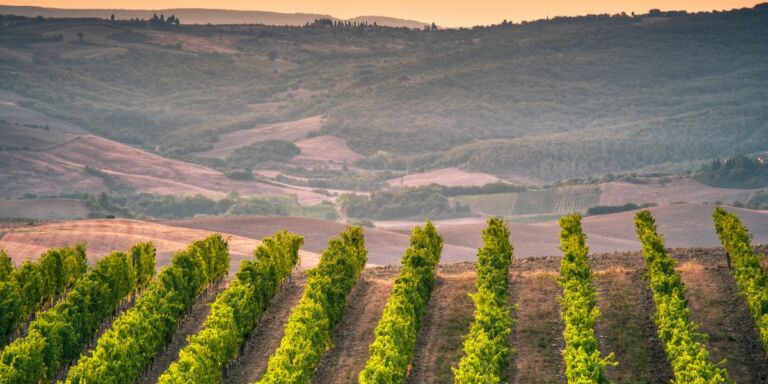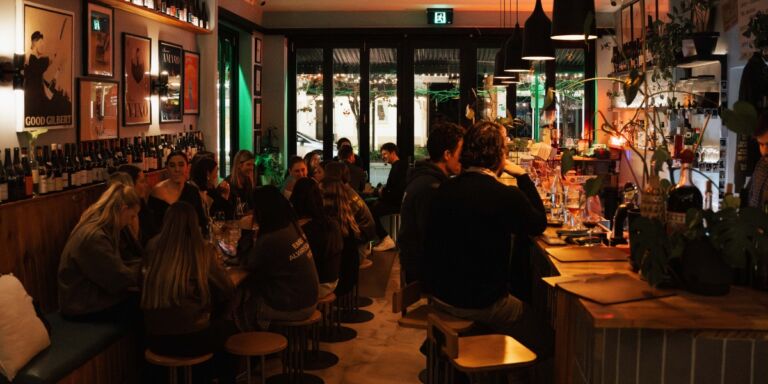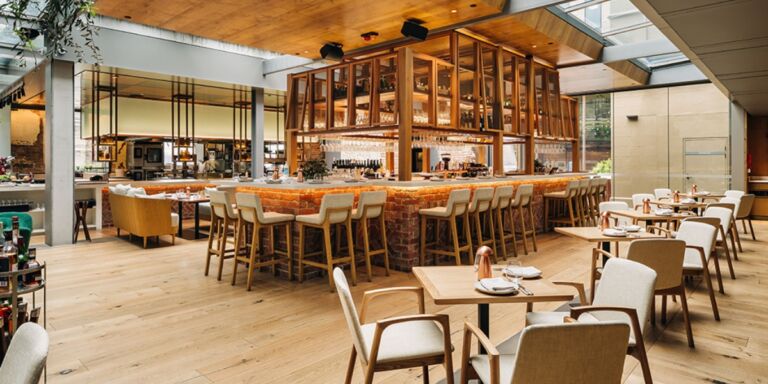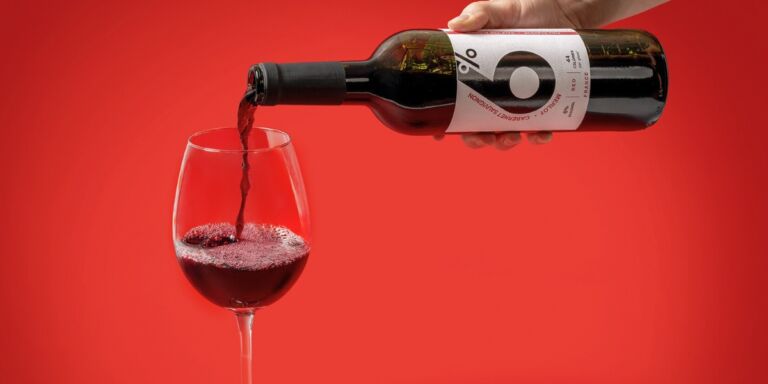You know London’s hospitality scene is bouncing back when Ryan Chetiyawardana says he’s launching a new bar. Yet the arrival of Seed Library at the new One Hundred Shoreditch Hotel signals something of a sea-change for the bar founder who goes by the Mr Lyan moniker and who has, within the last decade, become one of the best-known bartenders in the world. For starters with Seed Library, there’s no use of the ‘Lyan’ imagery that features at fellow bars Lyaness (London), Super Lyan (Amsterdam) and Silver Lyan (Washington DC). ‘It’s really tough to find another Lyan name,’ laughs Chetiyawardana. ‘I suppose it also reflects that it is quite a different bar in the group.’
Chetiyawardana, 37, tells me over the phone that Seed Library doesn’t have a ‘concept’ in the same way that his past bars did. It’s less ‘overly polished’, more ‘stripped-back’. Not dismissing his other venues, he describes it as the place he and his team would want to hang out, a relaxed setting inspired by UK pub culture and the New York bar scene. Inevitably, Covid has had an impact on that direction. ‘We had a bit of reflection on what we needed, given the last few years,’ says Chetiyawardana. ‘I think it’s made people yearn for something that feels a little bit more real, human and organic.’

At the start of 2020, Chetiyawardana was coming to the end of an ambitious rollout of three bars within the space of one year. ‘It was super-fun running around the way I used to, but I didn’t really see anyone. I was fortunate to have friends on the road – I don’t want to make it sound grim or anything like that. But at the same time, it was a very different way of living and not necessarily a very balanced one.’ Chetiyawardana went from ‘100-hour weeks’ jetting around the world to shielding during lockdown. He may have been forced to slow down and take stock, but thankfully there was no accompanying existential crisis. ‘It’s certainly not changed my love of hospitality, but I think it’s made me realise that to be passionate about something… it doesn’t mean I need to be on the road as much as I used to.’
Instead, Seed Library is opening (March 3) in east London, Chetiyawardana’s stomping ground and where the Lyan journey first began. ‘It’s nice to be able to come back to that origin point,’ he says. ‘The area’s gone through a lot of change. And that’s mirrored in our own journey.’ Hoxton’s White Lyan was the first bar in the Mr Lyan fold, open from 2013 to 2017. The game-changing venue challenged the way the hospitality industry approached ideas around sustainability, and with its absence of perishables on the menu – including citrus and ice – it was ahead of its time.

‘I think we’ve scratched the surface in terms of the impact we’ve had with our work,’ says Chetiyawardana. But he also acknowledges that the pandemic has helped fast-track certain conversations on and attitudes around the subject of sustainability. As such, Seed Library’s cocktails will be more about exploration, with the team encouraged to ‘let go of the reins’ and look at drinks away from what he describes as a ‘Western knowledge set’ – which is where you’ll find the Sancho Leaf Martini and the Perilla Gin and Tonic.
It seems restrained, a far cry from Mr Lyan’s days of Concrete Sazerac cocktails or the ‘newly created’ ingredients put to use at Lyaness (the likes of ‘Infinite Banana’ and ‘Oyster Honey’) – but of course, the creativity and techniques are still dialled up to 100. The serial bar founder – who grew up in Birmingham, UK, as the youngest of three – says he suffered from a short attention span in childhood and was desperate for an outlet for his passions, most notably in the arts and sciences. It’s fair to say he’s channelled that to full affect at his string of bars.


He’s also managed to retain his signature enthusiastic streak – and that’s despite the challenges faced by his industry and on a personal professional level in the last two years (one of the Lyan group, Cub, was a casualty to Covid, closing its doors for good in 2020). During our conversation, he even manages to make a positive out of a period he spent in hospital in his early 20s: ‘It was particularly hairy,’ he says, before hastening to add, ‘I suppose the nice part of it is my dad saved my life.’ So what’s his secret to staying as content, in his words, as ‘a really dumb puppy’?
‘Even when it’s a particularly tough scenario, I think it’s much more pleasant to dwell on the positive side of things,’ he says. ‘I like silver linings.’
Read on for Ryan Chetiyawardana’s life lessons…
What was your childhood ambition?
In one sense it was finding an outlet for my passions in science, and in arts, but in other senses, I was really trying to find an outlet that would keep me interested. I knew I had a short attention span (similarly recognised by my dad, a cancer specialist by career, who discouraged me from following him down a medical route as he thought I would get frustrated). So I had the plan to find something that didn’t create monotony. I also told my brother and sister that I was going to build a rocket to the moon when I was age six.
What do you know now that you wished you’d known when you were 21?
That no one knows what they’re doing, that that’s ok, that it’s really easy to ask for help, and that people really do want to help.
What exercise do you do?
Currently, I walk (outdoors) and I row (indoors), but I used to play rugby and do a lot of martial arts. This is reflected in how I’m now fat.
What is the character trait you most wish you could change in yourself?
I can’t have a TV on near me; I turn into a zombie. But this is similar with most electronics – I can’t do two things at once, and they suck all attention from me.
What is the most expensive thing you’ve ever bought (aside from property)?
Most precious things I own, I bought cheap and they’ve just become very expensive. Apart from baller meals with pals, the most expensive thing was probably a vintage Porsche when I was 21 – I’d just come out of hospital and took out a loan to buy it as a celebration of not being dead. I think it was the timing and the perspective but I was like, “Screw this, I’m buying a Porsche”.
If you could live anywhere, where would it be and why?
I would love to do small bits of time in Tokyo, or Mexico, or Sri Lanka, or Spain… and I would love to live in Scotland again. But I love living in London.

If you could do any other job what would it be and why?
I always think about how I could easily have gone into design given some of the work I was doing at Art College (scuppered by being in the shadow of a very successful designer sister, who now runs an innovation company). I did a load of music growing up. But I went down the visual arts route, and I don’t really know why there was any need to differentiate it and split it off, but I did. But at a different juncture, I would’ve stuck with my musical side – I can imagine a life of writing power pop!
What luxury item would you take with you to a desert island?
I presume I have my girlfriend with me, so maybe decks and some vinyl – there are definitely albums I could live in for a lifetime.
What haven’t you yet achieved that you want to?
There is still a lot of legitimacy and recognition I’d like to be afforded to the world of food and drink, and then within that, the brilliance that is occurring in the drinks side of this. But I also think we’ve scratched the surface in terms of impact we’ve had with our work in terms of human and environmental balance and sustainability, so making real traction in those areas would be huge. And then to be able to gain the trust to push forwards with bolder, more ambitious and longer-term thinking on projects would be amazing.
If you were king or queen of the world, what’s the first law you would enact?
Wider, richer and more holistic education for all – so many problems and conflicts would dissolve with this. But also universal, free healthcare to include mental health, and a much more equitable sense of balance. And, of course, a fairer and realistic tax structure to redress inequalities and to pay for all this.
Who would you invite to your fantasy dinner party?
David Bowie, David Attenborough, Grace Jones, Serena Williams, James Murphy, Pablo Picasso, Marie Curie and all my close friends and family. I haven’t met David Attenborough. That’s something I’ve tried to press various friends on who have a vague connection to him, but I haven’t been able to meet him yet. I don’t usually get fazed by celebrities when they come to the bar, but the musicians tend to do it.
What’s your guilty pleasure?
Super-polished power pop, peanut butter, lo-brow/high-brow combos (like Pringles with caviar at Black Axe Mangal – sometimes you don’t need to double down on the really superlative things!).
What’s your secret talent?
I’m good at throwing things…?
When were you happiest?
I’m kind of like a really dumb puppy – I’m (thankfully) genuinely happy most of the time. But bliss is tea, my girlfriend Annabelle, nature, music and a book.
Who do you most admire?
My sister Natasha – a real tour de force, and objectively the most talented person in the world. Shout out to my brother, too – especially for being frustratingly stubborn and stupidly brilliant in equal measure.
Which words or phrases do you most overuse?
‘Yahoo!’, and ‘A rising tide helps all ships’.
What’s your greatest regret?
Not backing myself and buying all the Japanese whiskies I said were great and got laughed at for.
What time do you go to bed?
It varies, but I sleep late and get up early. But I’m pushing for sleeping for a reasonable amount of time and hitting a better balance after noticing I’ve been chronically tired having worked 100 hour weeks for the last 20 years.

What album, boxset or podcast would you listen to on a night in alone on the sofa?
Led Zeppelin’s BBC Sessions, Robert Johnson’s The Complete Recordings and the Warp Records anniversary compilations.
What’s your favourite thing in your wardrobe?
Brightly coloured jumpers and loud hi-tops.
What’s your favourite restaurant?
Silo, Black Axe Mangal, St.John, Timberyard and noma all having a baby together.







